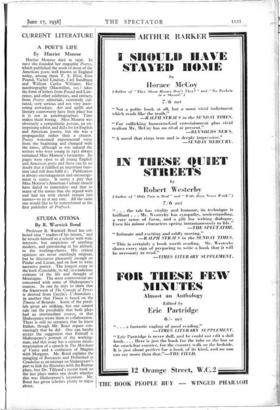Professor R. Warwick Bond has col- lected nine " studies
of his leisure," and he reveals himself as a scholar with wide interests, but suspicious of anything modern, and patronising in his attitude to the working-classes. His critical opinions are never startlingly original, but he discourses pleasantly enough on Pindar and Lucan, and on how to write narrative poetry. The longest essay in the book (Constable, 7s. 6d.) is a judicious estimate of the life and thought of Montaigne. The most controversial are concerned with some of Shakespeare's sources. In one he tries to show that the framework of The Comedy of Errors is derived from Cecchi's L'Ammalata ; in another that Timon is based on the Timone of Boiardo. Some of the paral- lels given are striking, but one cannot rule out the possibility that both plays had an intermediate source, or that Shakespeare wrote them in collaboration. There is still no certainty that he knew Italian, though Mr. Bond argues con- vincingly that he did. One can hardly accept the suggestion that Falstaff is Shakespeare's portrait of the working- man, and this essay has a curious misin- terpretation of a speech in The tVfirchant of Venice and a confusion of Maginn with Morgann. Mr. Bond explains the mingling of Boccaccio and Holinshed in Cymbeline as an attempt on Shakespeare's part to link the Histories with the Roman plays, but Dr. Tillyard's recent book on the last plays makes one doubt whether this was Shakespeare's intention. Mr. Bond has given scholars plenty to argue about.


















































 Previous page
Previous page